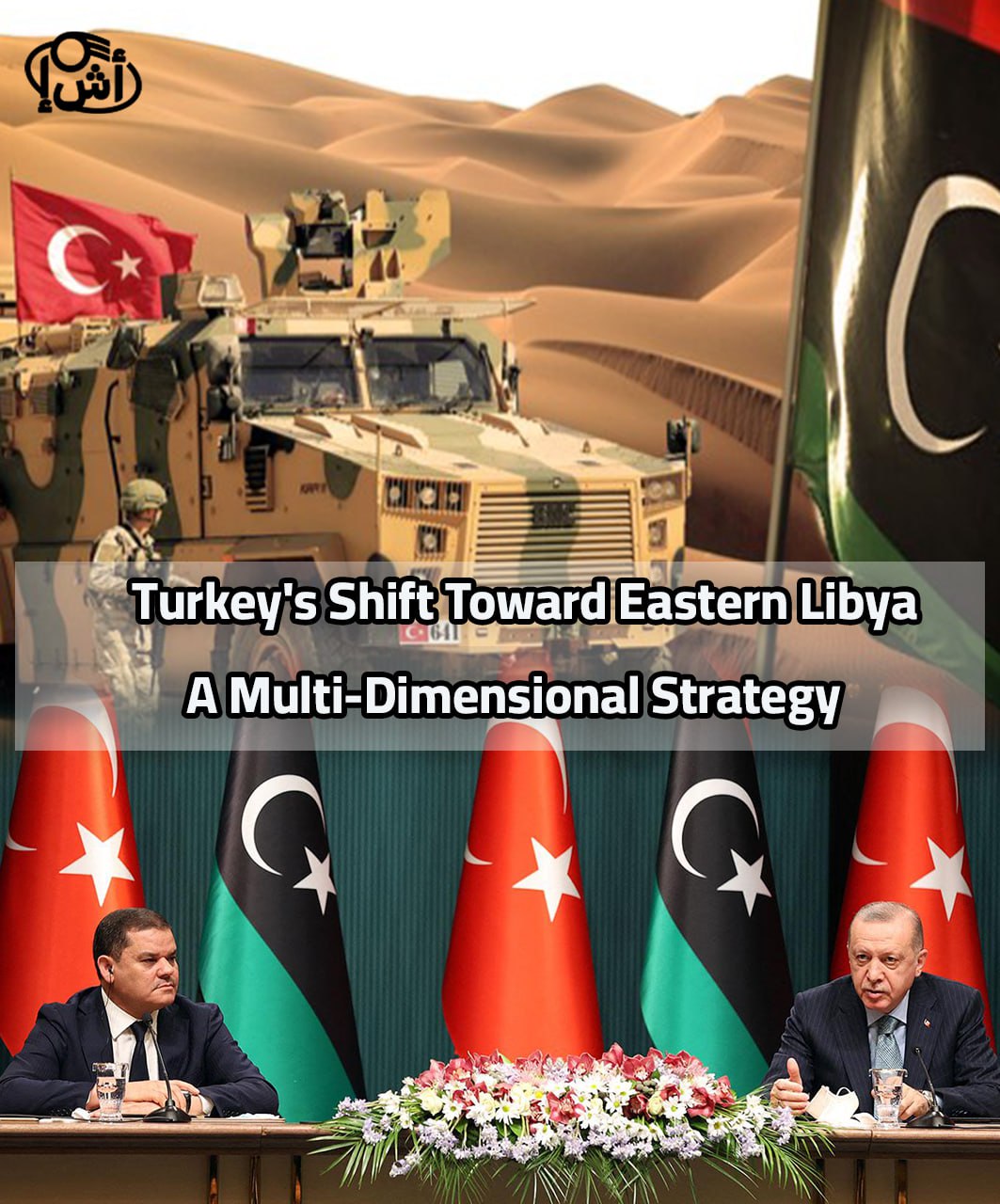After years of supporting the troubled western Libya and the Tripoli government, Ankara is trying to keep up with the political changes witnessed in the region, by moving towards the more stable eastern Libya, which opens the door to a new era in the nature of Turkish relations in Libya.
The course of Turkish relations with Libya seems linked to the government of President Recep Tayyip Erdogan’s search to strengthen Ankara’s influence in the Mediterranean, and its attempt to compete in the process of oil and gas exploration, which has emerged as a fundamental point in Turkish policy. It wanted to confirm its right to the issue of gas fields in the Mediterranean, amid its fear that Cyprus would obtain privileges in this matter. The Turkish intervention in Libya sparked a severe political crisis that was not limited to Libya, as it extended to the eastern Mediterranean, and practically disrupted the balance in the relationship between Turkey and Greece, with Athens siding with the position taken by Cyprus regarding Turkey’s moves towards Libya.

Turkey and the Beginning of Intervention
Turkish intervention in Libya officially began in January 2020, when the Turkish parliament approved sending forces to support the Government of National Accord, which was fighting the forces of Field Marshal Khalifa Haftar. This intervention came after the signing of a memorandum of understanding between Turkey and the Government of National Accord in November 2019, regarding security cooperation and defining maritime borders, which gave Turkey the right to exploit resources in the eastern Mediterranean, and began deploying its forces and military equipment, as Ankara announced in March 2020 the “Peace Storm” operation to support the Government of National Accord, where it regained important coastal areas.
The Turkish intervention enabled the Government of National Accord forces to regain control of the capital, Tripoli, and this created political tension, especially between Egypt and Turkey, as Cairo seemed upset from the beginning of the relationship, especially in the issue of demarcating the maritime borders. However, relations between the two countries improved again in 2021, with the start of exploratory talks between the two countries. In 2023, visits were exchanged between officials from the two countries, including the visit of Egyptian Foreign Minister Sameh Shoukry to Ankara and the visit of his Turkish counterpart, Mevlut Cavusoglu, to Cairo, followed by the visit of Turkish President Recep Tayyip Erdogan to Egypt on February 14, which had implications that went beyond normalizing relations between the two countries and raising them to the required level to establishing a new geopolitical axis.

Turkey’s shift towards eastern Libya
The visit of the commander of the Libyan Armed Forces, Field Marshal Khalifa Haftar, to Turkey and his meeting with Turkish Foreign Minister Hakan Fidan can be considered an indication of a noticeable shift in relations that are trying to end a general political tension that is not limited only to the military conflict with eastern Libya, but also in Ankara’s relations with North Africa. It is now trying to reposition itself politically after settling its differences with Egypt. The rapprochement aims to influence multiple levels of dialogue and understanding, and proposes a new political path that can be read through two points:
- The first is Ankara’s view of the situation in Tripoli in light of the Dbeibeh government’s inability to control the situation in western Libya, and its lack of any political vision towards building integrated Libyan relations on all Libyan lands. In western Libya, there are many international political factors, which makes the Turkish role limited despite the great support it has provided to the Tripoli government. Turkey is not only seeking to find a balance in its relations between the East and the West, but also to open wider doors for Turkish interests in a stable Libyan region.
- The second matter is the search for a different role in any political understanding between the Libyan parties. Ankara is currently trying to establish a position as a political mediator and partner in facilitating the dialogue process between the parties in eastern and western Libya.

Certainly, the economic importance of eastern Libya cannot be ignored, given Turkey’s focus on the oil and gas sectors, as Ankara is working to enhance its investments in these sectors, by reactivating and modernizing the Libyan energy and communications systems, as confirmed by the visits of the Turkish expert team to power stations in Benghazi and local control centers. These efforts aim not only to enhance the infrastructure but also to rehabilitate Turkish-Libyan relations on the basis of mutual benefit.
As for Turkey, it has no limits to its relations with eastern Libya, including military cooperation, and although no indications of such a matter have emerged, it is clear that Turkish ambition in eastern Libya could constitute a major axis that affects the Libyan political equation in general. The Turkish orientation towards eastern Libya does not come in a vacuum, but rather reflects a broader strategy aimed at enhancing the Turkish role in North Africa and the Mediterranean. Turkish policy seeks to balance between political and military support for the expired Government of National Accord in Tripoli and building relations with all parties in Libya. This multi-faceted approach allows Ankara to play a pivotal role and makes it a political partner in the Libyan political process.
There is a Turkish strategy towards eastern Libya that is currently taking shape, after decades of Ankara focusing primarily on its Asian surroundings. Ankara wants to influence the formation of power dynamics in eastern Libya and change the current axes of support, which will create new political and economic interactions. Turkey is not only seeking to achieve economic gains, but also to ensure an effective and sustainable role in the Libyan arena.
Nidal Al-Khedary
American fears of Moscow prompt them to reopen their embassy in Libya
